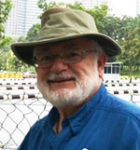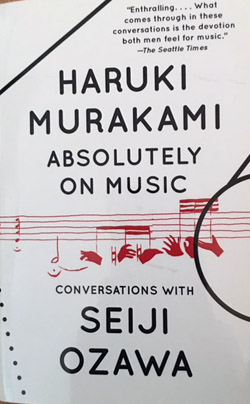Absolutely on Music: Haruki Murakami Conversations with Seiji Ozawa (2017), 353 pages.
© Oliver B. Pollak

 RICHMOND, California — I saw this book at the Jackson Hole Book Trader. Music and conversation between a brilliant author and a conductor — buy the book, find the time to read it. I already owned Parallels and Paradoxes: Explorations in Music and Society (2002) by Daniel Barenboim and Edward Said. Absolutely on Music will enhance understanding live classical music, symphony, and opera, and private appreciation of radio, vinyl and digital recordings. Share the Japanese embrace of Jewish musical icons Leonard Bernstein, Gustav Mahler, and klezmer. The orchestra is family, friends, colleagues, teachers, students, audiences, sometimes harmonious, sometimes contentious.
RICHMOND, California — I saw this book at the Jackson Hole Book Trader. Music and conversation between a brilliant author and a conductor — buy the book, find the time to read it. I already owned Parallels and Paradoxes: Explorations in Music and Society (2002) by Daniel Barenboim and Edward Said. Absolutely on Music will enhance understanding live classical music, symphony, and opera, and private appreciation of radio, vinyl and digital recordings. Share the Japanese embrace of Jewish musical icons Leonard Bernstein, Gustav Mahler, and klezmer. The orchestra is family, friends, colleagues, teachers, students, audiences, sometimes harmonious, sometimes contentious.
The Japanese conductor Seiji Ozawa was born in Manchuria in 1935. Murakami was born in 1949. During their respective teenage years Ozawa and Murakami became enthralled with classical music on long play vinyl records. They attend the same Tokyo gym.
Ozawa served as assistant conductor to Leonard Bernstein and the New York Philharmonic. New York Times music critic Harold Schonberg who criticized Bernstein had a soft spot for Ozawa. Ozawa served as music director of the Toronto Symphony, San Francisco Symphony, and spent 29 years at the Boston Symphony. His seven years at the Vienna State Opera “was like best friends getting together to make music.” He has appeared at music venues around the globe and is intensely involved with teaching youth and emerging musicians in orchestra settings in Japan, especially the Saito Kinen Orchestra.
Ozawa developed cancer of the esophagus in 2010 which slowed him down a bit. While he was recovering, the preeminent Japanese author Haruki Murakami interviewed Ozawa six times between November 2010 and July 2011, over hot hojicha tea, rice cakes, o-nigiri rice ball, and papaya, in Tokyo, Honolulu, on an express train from Geneva to Paris, and Switzerland.
Conversations and interactions between brilliant musicians and writers reveal facts, facets, attitudes, and sensibilities capable of heightening the reader’s and listener’s cultural appreciation. Japan has a population of 127 million with about 2000 Jews. Imagine going from a country with a scarcity of Jews to New York, where the Jewish presence is second only to Israel, and becoming a minority. Ozawa and Murakami are extraordinarily cosmopolitan with knowledge of Jewish culture.
Conducting symphonic music and writing novels are rigorous pursuits. Ozawa and Murakami both start reading scores and writing, in the dark, between four and five in the morning.
They immerse themselves in their pursuits.
Ozawa had cross cultural advantages and limitations. In response to a question about Berlioz, Ozawa responded, “Difficult? His music is crazy! Sometimes I don’t know what’s going on, either! Which may be why his music is suited for being performed by an Asian conductor.”
Ozawa self-effacingly states that he would have learned much more from Leonard Bernstein and other conductors if his English and German were better. “What really matters is how you wave your baton during rehearsals” The baton was perhaps an affectation for the actual performance.
Ozawa’s interaction with composers, musicians, conductors, audiences, record companies, and no doubt boards of directors and donors is rich with creativity and competing agendas. Among the Jewish personalities in the book, in alphabetical order, are Martha Argerich, Leonard Bernstein, Daniel Barenboim, Erick Friedman, Harold Gomberg, Joseph Krips, Erich Leinsdorf, Lorin Maazel, Pierre Monteux, Itzhak Perlman, Arthur Rubenstein, Arnold Schoenberg, Peter Serkin, Rudolf Serkin, Corky Siegel, Joseph Silverstein, Sir George Solti, William Steinberg, Isaac Stern, George Szell, and Bruno Walter.
Ozawa recognized “there are areas deep down where I can’t fully grasp what they’re feeling or thinking.” He was sure they had the same limitations with himself, with a Buddhist father and a Christian mother. “I suspect they think they can’t fully understand me!”
“We Japanese and other Asian people have our own special kind of sorrow. I think it comes from a slightly different place than Jewish sorrow or European sorrow.” Understanding the different mentalities can open up the music. An Asian conductor can bring out Mahler’s special flavor.
Two major chapters focus on Canadian Glenn Gould, who is not Jewish, and his performance of Beethoven’s Third Piano Concerto; and Gustav Mahler, who converted to Catholicism so that he could conduct the Vienna Opera and whose music was wiped out by the Nazis. Captivating pages of conversation elucidate performance variation of the identical score in Boston, New York, Chicago, or Cleveland resulting from a combination of musician and conductor talent and interpretation. Silence, the length or reverberation, and the acoustics of the hall are all elements of the performance. Despite the globalization of culture and digital recording, orchestras are unique.
This revealing dialogue of great minds will make sitting intently for two hours in an orchestra hall seat even more meaningful. For Ozawa “music, of course, is an art that occurs through time,” searching for the “heart’s natural resonance.” Murakami suggests that the ear, music, and rhythm are vital to writing fiction. His command of musical imagery is revealed in this description, “the strings and the wind instruments clash head-on and become entangled, like the tails of several complicated dreams.”
*
Oliver B. Pollak is a freelance writer in Richmond. He may be contacted via oliver.pollak@sdjewishworld.com